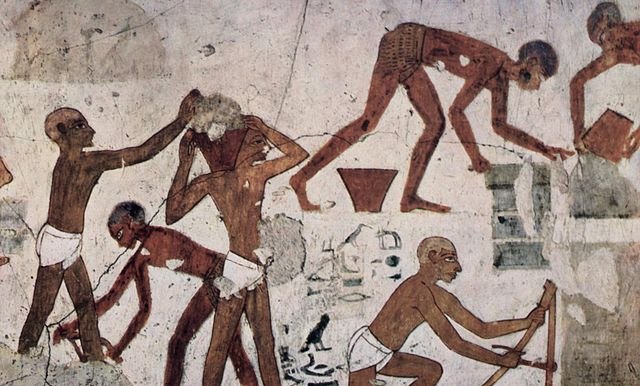
Harsher repression
The Israelites’ resentment of Moses, the liberator, only intensified their difficulties, displaying a short-sightedness that failed to consider the lasting glory and prosperity that would come with the Exodus. They were unable to endure even the temporary hardships along the way. Furthermore, Moses’ immediate appeal to God, without demonstrating the unwavering will and unyielding determination of a mountain, did not reflect the behavior of a mature leader. Yet, these attitudes toward God during the process of salvation are often displayed by the saints who are saved through the darkness of each age.
Pharaoh’s Delusion
Moses and Aaron, empowered by the authority of God’s Word, approached Pharaoh, and boldly cried out, “Let my people go!” When Pharaoh heard this cry, he arrogantly asked, “Who is the LORD?” Filled with absolute power as the ruler of the largest kingdom in the ancient world, Pharaoh dismissed the command of a mere slave god, not recognizing the true God of Israel. To Pharaoh, the gods of the enslaved people were nothing more than objects of scorn and ridicule. Therefore, Pharaoh declared that he would never release the Israelites because he did not know God.
Reinforced Warnings
Moses and Aaron’s attempts to convince Pharaoh through human power were completely futile. A second attempt to change Pharaoh’s mind proved unsuccessful. Moses and Aaron asked for time off from work to offer sacrifices to the God of Israel, and they pointed out the dire consequences of disregarding this request. Acting like despotic monarchs throughout history, Pharaoh sought to prevent any stirrings of freedom by imposing even greater burdens on the Israelites.
Piling on the Plagues
Pharaoh vehemently rebuked Moses and Aaron, accusing them of inciting the Israelites to hate work and diminishing their motivation. He denounced their demands as falsehoods and impure intentions and imposed even harsher hardships on the Israelites than before. Pharaoh regarded Moses and Aaron’s appeals as unjustifiable claims made to promote laziness. Moreover, despite the pleas of the Israelite captains, Pharaoh not only refused to grant concessions, but unreasonably demanded that the captains ensure the people produced the full quota of bricks without any deficiency.
Israel’s Discontent Grows
Pharaoh’s tactics succeeded, and the Israelites no longer supported Moses and Aaron as a unified group. It became evident that Pharaoh’s anger toward the Israelite leaders’ refusal to heed their appeals had caused the Israelites considerable trouble. The blame shifted from Moses and Aaron to God Himself, as the people demanded divine judgment and intervention against them.
Reflecting
God acted forcefully, not to persuade Pharaoh, but to coerce him into submission through harsh measures. This was God’s approach when dealing with stubborn individuals like Pharaoh. Despite Moses’ stern warnings, Pharaoh stubbornly refused to comply with their demands, resulting in ten unimaginable plagues that afflicted him and his people. Those who disregard God’s warnings face appropriate punishment. However, the Israelite captains failed to discern God’s will and instead condemned His people. It is therefore important that we do not speak casually about God’s will nor misuse it to condemn others.
